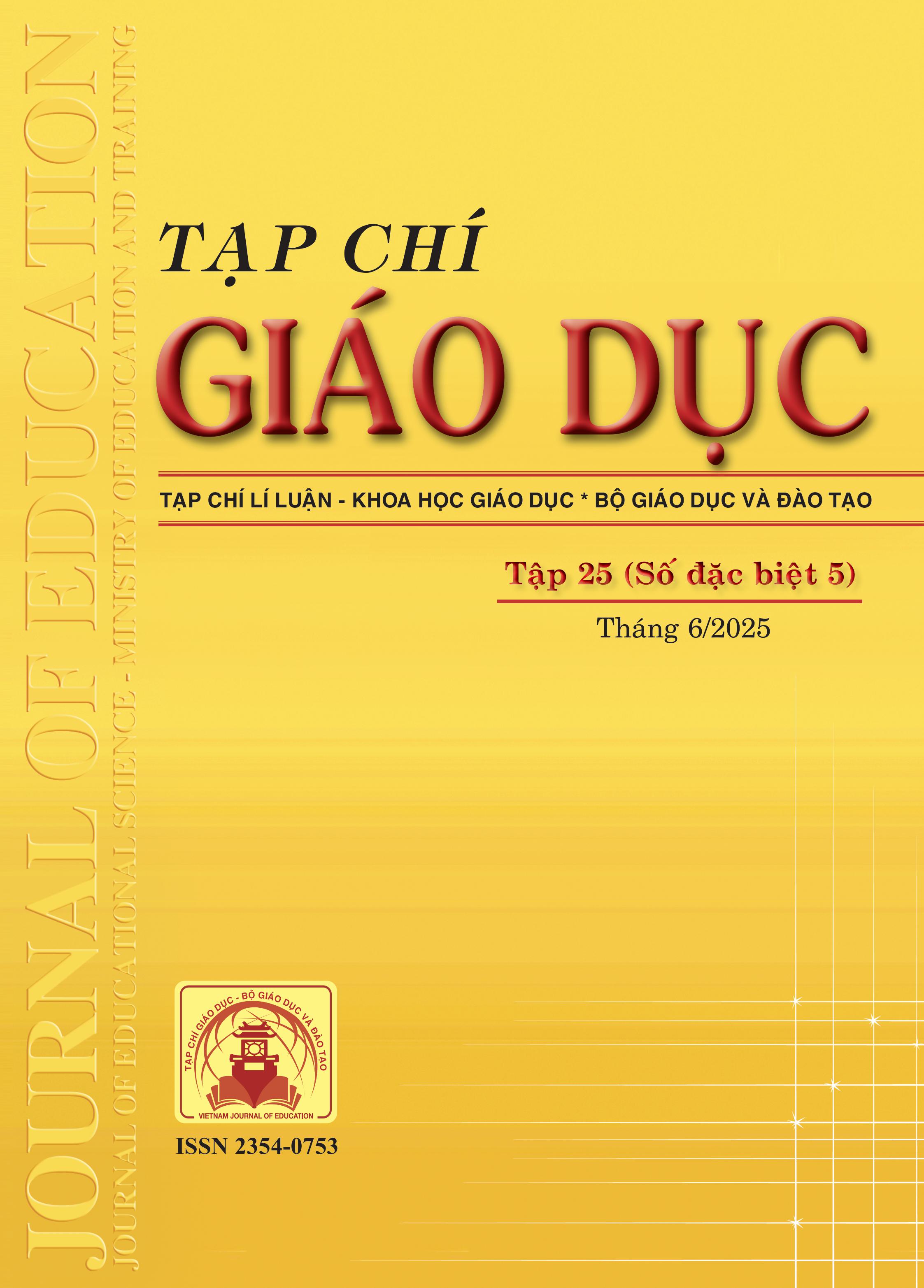Một số vấn đề lí luận về phương tiện dạy học số trong giáo dục tiểu học
Tóm tắt
In the context of digital transformation, digital teaching means are increasingly affirming their important role in innovating and improving the effectiveness of primary education. This article systematically examines the theoretical foundations of digital teaching media, which clarifies the concept, classification, relationship with modern learning theories, as well as the specific characteristics of primary school students when approaching the digital teaching environment. Based on the analysis and synthesis of research works, the article presents the roles, benefits and challenges of applying technology to primary school teaching. From there, the article proposes solutions to enhance the efficiency of using digital teaching facilities, emphasizing teacher training, infrastructure investment, policy development and expanding cooperation with families and communities. The research method mainly includes analyzing and synthesizing documents, combined with practical observation and collecting expert opinions, towards a humane and sustainable implementation strategy, meeting the needs of primary education innovation in the digital era.
Tài liệu tham khảo
Anghelo Josué, Bedoya-Flores, M. C., Mosquera-Quiñonez, E. F., Mesías-Simisterra, Á. E., & Bautista-Sánchez, J. V. (2023). Educational Platforms: Digital Tools for the teaching-learning process in Education. Ibero-American Journal of Education & Society Research, 3(1), 259-263. https://doi.org/10.56183/iberoeds.v3i1.626
Arwin, A., Kenedi, A. K., Anita, Y., Hamimah, H., Handrianto, C., & Zainil, M. (2024). STEM-based digital disaster learning model for disaster adaptation ability of elementary school students. International Journal of Evaluation and Research in Education, 13(5), 3248. https://doi.org/10.11591/ijere.v13i5.29616
Badshah, A., Nasralla, M. M., Jalal, A., & Farman, H. (2023). Smart Education in Smart Cities: Challenges And Solution. 2023 IEEE International Smart Cities Conference (ISC2), 01-08. https://doi.org/10.1109/ ISC257844.2023.10293615
Cardenas, R. M. (2020). Educational Digital Media Tools to Reformulate Activity and Object in Indigenous Science and Environmental Education. EDU REVIEW. International Education and Learning Review/Revista Internacional de Educación y Aprendizaje, 8(3), 127-134. https://doi.org/10.37467/gka-revedu.v8.2666
Crum, T. (2021). Teachers’ perceptions regarding the use of interactive whiteboards to enhance elementary literacy development. 18th International Conference Cognition and Exploratory Learning in Digital Age 2021. https://doi.org/10.33965/celda2021_202108C043
Darmayanti, M., & Amalia, A. (2024). Bahan Ajar Digital dalam Pembelajaran di Sekolah Dasar: Analisis Bibliometrik dan Systematic Literature Review. https://doi.org/10.30762/sittah.v5i1.2536
Derder, A., Sudaria, R. V., & Paglinawan, J. (2023). Digital Infrastructure on Teaching Effectiveness of Public-School Teachers. American Journal of Education and Practice. https://api.semanticscholar.org/ CorpusID:266656243
Đào Thái Lai (chủ biên), Nguyễn Ngọc Giang, Lê Văn Hồng, Nguyễn Thị Quốc Hòa, Phạm Thanh Tâm, Nguyễn Bạch Yến (2023). Xây dựng sách điện tử tương tác trong bối cảnh giáo dục 4.0. NXB Khoa học Kĩ thuật.
Handayani, W. (2024). Use of Interactive Learning Technology in Improving Literacy Skills in Elementary Students. International Journal of Students Education, 22(2), 258-260. https://doi.org/10.62966/ijose.vi.776
Hidayanthi, R., Siregar, N. H., Siregar, D. A., & Siregar, H. (2024). Implementation of STEAM-based digital learning for students’ numeracy literacy in elementary schools. Research and Development in Education, 4(1), 653-661. https://doi.org/10.22219/raden.v4i1.32663
Hori, R., Fujii, M., Toguchi, T., Wong, S., & Endo, M. (2025). Impact of an EFL Digital Application on Learning, Satisfaction, and Persistence in Elementary School Children. Early Childhood Education Journal, 53, 1851-1862. https://doi.org/10.1007/s10643-024-01653-5
Lee, D., Huh, Y., Lin, C.-Y., & Reigeluth, C. M. (2018). Technology functions for personalized learning in learner-centered schools. Educational Technology Research and Development, 66(5), 1269-1302. https://doi.org/10.1007/s11423-018-9615-9
Mansur, M., Nurwahidin, M., & Herpratiwi, H. (2024). Implementation of Digital-Based Learning Media on Thematic Material on Students’ Scientific Abilities. Jurnal teknologi pendidikan: jurnal penelitian dan pengembangan pembelajaran, 9(2), 136. https://doi.org/10.33394/jtp.v9i2.7528
Metasari, A., & Amalia, N. (2024). Analytical Study: the Use of Digital Technology-Based Learning Media at Alam Surya Mentari Elementary School. Jurnal Elementaria Edukasia, 7(2). https://doi.org/10.31949/jee.v7i2.9302
Moya, S., & Camacho, M. (2023). Developing a Framework for Mobile Learning Adoption and Sustainable Development. Technology, Knowledge and Learning, 28(2), 727-744. https://doi.org/10.1007/s10758-021-09537-y
Portela, F. (2020). TechTeach-An Innovative Method to Increase the Students Engagement at Classrooms. Information, 11(10), 483. https://doi.org/10.3390/info11100483
Shvardak, M. V. (2023). Digital interactive technologies in the educational process of primary school. Scientific Journal of the Khortytsya National Academy. Series: Pedagogy. Social Work, 8, 39-48.
Tan, C., Casanova, D., Huet, I., & Alhammad, M. (2022). Online Collaborative Learning Using Microsoft Teams in Higher Education Amid COVID-19. International Journal of Mobile and Blended Learning, 14(1), 1-18. https://doi.org/10.4018/IJMBL.297976
Zuhri, R. S., Wilujeng, I., Haryanto, H., & Ibda, H. (2024). Information communication technologies education in elementary school: a systematic literature review. Journal of Education and Learning, 18(3), 1070-1082. https://doi.org/10.11591/edulearn.v18i3.21435
Đã Xuất bản
Cách trích dẫn
Số
Chuyên mục
Giấy phép

Tác phẩm này được cấp phép theo Ghi nhận tác giả của Creative Commons Giấy phép quốc tế 4.0 .












